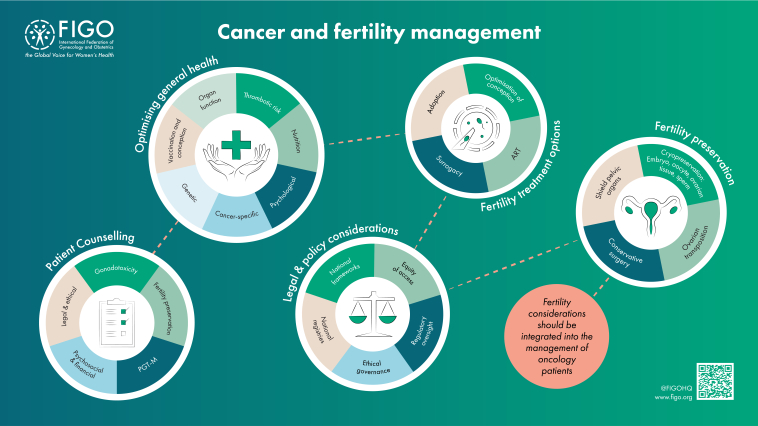A new International Journal of Gynecology & Obstetrics (IJGO) paper from FIGO offers crucial best practice advice on fertility preservation for cancer patients of reproductive age, amid rising cancer rates in young adults.
The paper highlights the critical need to integrate fertility preservation into standard cancer care. Treatments such as chemotherapy, radiotherapy and surgery, as well as newer targeted and immunotherapies, can all negatively affect fertility. This guidance emphasises the importance of early, collaborative counselling between oncology and fertility teams to help patients make informed choices within narrow treatment windows.
The paper reviews how fertility outcomes vary depending on cancer type, treatment regimen and individual factors such as age and ovarian reserve. It outlines current fertility preservation options, including oocyte and sperm cryopreservation, ovarian tissue freezing and fertility-sparing surgery. Post-treatment options such as assisted reproduction, surrogacy and adoption are also discussed, with consideration for medical, ethical and logistical barriers.
The guidance draws attention to global disparities, particularly in low- and middle-income countries (LMICs), where access to fertility services remains limited due to cost, infrastructure and awareness. It calls for national frameworks to embed fertility preservation into cancer care, supported by public funding or insurance coverage, legal clarity on reproductive material, and stronger ethical oversight.
In recent years, the incidence of cancer diagnoses among young women has been increasing. We have learnt that both cancer and its treatments can pose significant risks to fertility in those of reproductive age. However, there remains a lack of standardised guidelines for managing fertility in this context. This document aims to outline key considerations for fertility management among women with cancer, emphasising the necessity of balancing urgent cancer treatment with the preservation of fertility. Additionally, we stress the importance of integrating fertility considerations into routine oncological care for women of reproductive age.
– Dr Long Nguyen, co-author
With fertility concerns ranking high among young cancer patients, FIGO’s recommendations aim to ensure that fertility preservation becomes a standard part of comprehensive cancer care. Ongoing research is needed to improve fertility-sparing interventions, assess long-term outcomes and expand access for all patients worldwide.
Access the full guidance here.
